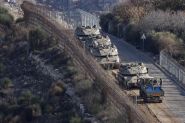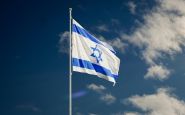
Morgan Ortagus, the US Deputy Special Envoy for the Middle East, is scheduled to arrive in Beirut tomorrow, Friday, as part of a renewed effort to resolve the ongoing conflict between Lebanon and Israel and to revive negotiations over border disputes.
Until yesterday, the Lebanese government had not been informed of Ortagus’s visit. However, reports suggest she discreetly visited Tel Aviv, initially excluding Beirut from her priorities.
A strong and clear message is expected from the US envoy, mirroring the one delivered during her previous visit to Lebanon. Talks between Ortagus and Lebanese officials are likely to cover strategic issues, including Hezbollah’s disarmament, the full deployment of the Lebanese Army in the south, the resumption of negotiations with Israel, the potential normalization of relations and the necessary domestic reforms.
Some local media have speculated that one topic on the agenda could be potentially extending UNIFIL’s (United Nations Interim Force in Lebanon) mandate to the Lebanese-Syrian border, in light of recent clashes between Shiite militias and Syrian forces.
This visit comes amid rising regional tensions, with the Trump administration’s “maximum pressure” policy aiming to end armed conflicts – potentially through force. However, the US approach is met with internal divisions among Lebanese leaders.
Hezbollah’s Weapons: A Key Point of Friction
Exclusive reports from Nidaa al-Watan indicate that Ortagus is set to urge Lebanese President Joseph Aoun to establish a clear timeline for Hezbollah’s disarmament, in line with the ceasefire agreement signed by Lebanon and Israel on November 27. She will also seek updates on the Lebanese Army’s full deployment in the south and the strengthening of state authority, while addressing both progress and remaining challenges.
Israel, backed by Washington, has conditioned the cessation of its attacks on Lebanon on the surrender of Hezbollah’s weapons. While President Aoun calls for the exclusive control of arms by the state, he has proposed an internal dialogue for a gradual disarmament of Hezbollah – an approach supported by France but rejected by the United States, which considers Israeli strikes a legitimate act of self-defense.
Hezbollah, however, remains steadfast in its opposition to disarmament, insisting on its role as the “resistance” against Israel and refusing to discuss surrendering its weapons as long as Lebanese territories remain occupied and UN Resolution 1701 is not fully enforced.
Border Negotiations
Ortagus may advocate for the establishment of working committees to resolve border issues with Israel and initiate the demarcation of borders. Washington also supports the normalization of relations between the two countries, a stance that deeply divides Lebanese officials. However, Lebanon remains firm, restricting negotiations to strictly security and technical matters, without addressing the issue of Hezbollah’s weapons for the time being.
President Aoun and Parliament Speaker Nabih Berri have conditioned any progress on the withdrawal of Israeli forces from the occupied territories. During his meeting with French President Emmanuel Macron in Paris, President Aoun stressed the need to address border issues, particularly the 13 disputed points, clarifying, however, that “the release of Lebanese prisoners and the Israeli withdrawal from the five contested positions are essential preconditions for considering negotiations on the disputed points.” Nevertheless, he did not completely rule out the possibility of normalization with Tel Aviv, highlighting that “Lebanon aligns with the Arab position” on this matter.
Worrying Signals
According to sources quoted in daily al-Anbaa, Beirut has recently received concerning signals indicating that Israel is continuing its targeted assassination operations and attacks on Hezbollah weapon stockpiles, regardless of their location.
Israeli Foreign Minister Gideon Sa’ar stated on Thursday that while Israel “seeks stability in Lebanon, it will not allow the Iran-backed group to rearm.” In fact, Israel has targeted Beirut’s southern suburbs twice since the fragile ceasefire between Hezbollah and Israel came into effect. “We aim to normalize relations with Lebanon,” Sa’ar remarked. He acknowledged that this may be “premature for Lebanon,” while underlining “the start of negotiations over certain border issues.”
Extension of UNIFIL’s Mandate?
A surprising proposal could signal a shift in how Lebanon’s security is managed: extending UNIFIL’s mandate beyond the southern border to also include the Lebanese-Syrian border. While this idea remains sensitive and uncertain, it is legally possible. Under Article 12 of Resolution 1701, the Lebanese prime minister has the authority to request the deployment of international forces wherever he deems necessary. Such a move to the Syrian border could invalidate the argument put forward by those advocating for Hezbollah’s weapons, which they claim are essential due to the Syrian threat.
Regional Situation
The success of these efforts will depend on realities on the ground and regional dynamics, as the power struggle between Tehran and Washington continues to play a central role. Israel and the US are ramping up pressure on multiple fronts: in Gaza, to free hostages and end Hamas; in Lebanon, to disarm Hezbollah; and in Yemen, to neutralize the Houthis and secure Red Sea trade routes. Trump is pushing for a deal with Iran, primarily focused on preventing the Mullahs from acquiring nuclear weapons. Should these efforts fail, Washington has increased its threats of military action against Iran’s nuclear facilities, which could dramatically escalate tensions – with Iran vowing a firm retaliation – and potentially reigniting the conflict in Lebanon.
A report from The Washington Post published Thursday suggests that a US-Israeli military strike against Iran could occur within the next few months, potentially in the first half of this year. While this option remains possible, it seems unlikely and undesirable for Trump, who has positioned himself as a champion of peace.




Comments